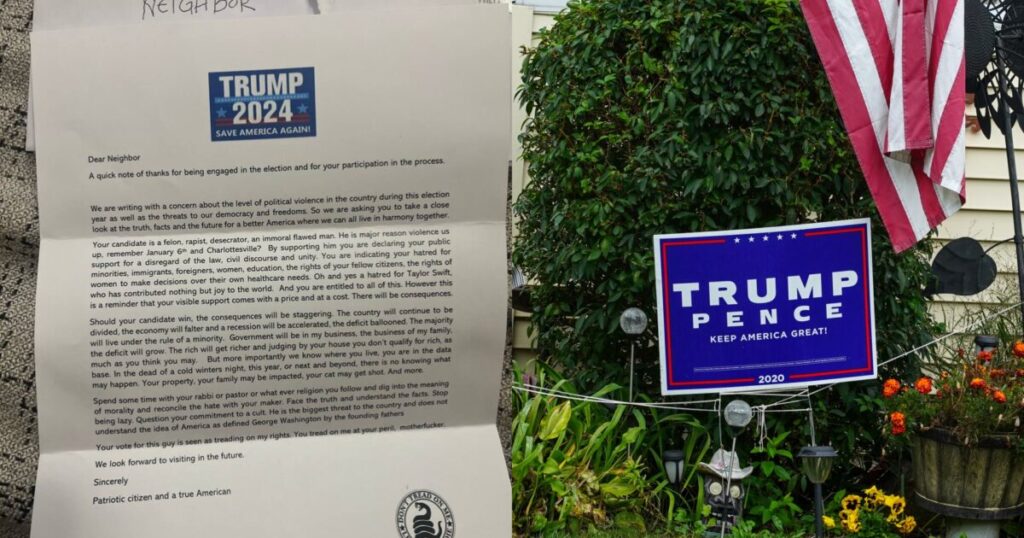In recent weeks, disturbing reports have surfaced from Pennsylvania indicating that supporters of former President Donald Trump are being targeted with menacing letters. These correspondence have been sent to residents, particularly in areas like Philadelphia, who proudly display Trump signs in their yards. The letters, which mimic official Trump campaign materials, initially appear to express gratitude for civic engagement but swiftly devolve into chilling threats. They warn recipients of severe consequences for their political stance, marking a troubling trend of intimidation and hostility directed towards Trump supporters.
One individual, identified as Janet from Penn Valley, recounted her distressing experience after displaying Trump signage on her property. She received a letter filled with hateful language and explicit threats aimed at her family and home. This incident was not an isolated one, as several other Trump supporters in the area also reported receiving similar letters. Although Janet reported her experience to the Lower Merion Police, local law enforcement has been hindered in their ability to investigate, citing a lack of evidence since the letters were delivered via mail without video proof of the delivery process.
These letters have spurred an atmosphere of fear and concern among Trump’s supporters in the region, who have confirmed that this troubling trend is widespread. Many recipients reported receiving the letters not only through the postal service but also without any postage directly placed in their mailboxes, further indicating an organized intimidation campaign. The content of the letters is both inflammatory and aggressive, beginning with disingenuous pleasantries before progressing to personal attacks against Trump and his supporters, labeling the former president as a “felon” and “rapist.”
The letters continue by claiming that support for Trump contributes to societal division and political violence, referencing events like the January 6 Capitol riot and other incidents to emphasize their point. The tone escalates as it accuses Trump supporters of harboring hatred for various demographics, including minorities and women, thereby framing their political choice as not merely a personal stance but as a broader cultural and moral failing. A shocking assertion included in these letters is a warning of “consequences,” specifically connected to the potential fallout if Trump were to win another term in office.
The letters are both a personal affront and a broader ideological challenge to supporters of the former president, with the authors suggesting that their visible political support could jeopardize their safety and the wellbeing of their families. The correspondence culminates in a threatening tone, implying the potential for violent repercussions, which augments the already tense political climate leading into an election year. The underlying message of resentment towards Trump supporters is unmistakable, effectively creating an environment where expressing political beliefs may come with personal risks.
In light of the ongoing threats to Trump supporters, the situation in Pennsylvania raises critical questions about political discourse and the safety of individuals expressing their views in a highly polarized environment. The letters highlight alarming trends of political intimidation and propose a need for broader societal reflection on the extremities of partisanship. As residents grapple with these unsettling disturbances, local law enforcement urges awareness and vigilance, but the chilling reality remains that fear tactics have begun to permeate the fabric of civic engagement in the community. Ultimately, these incidents serve as a stark reminder of the potential for political divisions to manifest in tangible and frightening ways.

